- Home
- Tim Powers
Nobody's Home Page 4
Nobody's Home Read online
Page 4
“Crumple the paper,” said Nobody hoarsely, “and drop it and the pendant into the circle below the stone.”
This time Jacky didn’t look at Nobody; she watched the paper and the glass vial strike the deck, and she saw a thin streak of light that shifted from green to bright white as it sprang from the vial and made a momentary spot of light on the surface of the stone.
She heard the wind of Nobody’s inhalation—and it didn’t stop. Again her ears popped, and the flap of the linen tent was fluttering in a new breeze.
She spun to look toward the ladder, and the cloudy figure was smaller—a patch of fog, a curl of diaphanous silk, a ripple in moonlight.
Over the whistling of Nobody’s continuing inhalation, she heard a tiny voice whisper, clearly, “Finish it, my love—act it out the same—I need it to look the same—you again, and me again, and the same pistol…”
She didn’t even need to hear the flintlock pistol rattling on the table to know what it meant. Finish it, she told herself, finish it for God’s sake.
She stumbled past the inflating figure of Nobody to the table, shook the thimbles from her hand and snatched up the pistol. Blinded with tears, she pointed the barrel toward the ladder, tugged the hammer back with her thumb and then pulled the trigger. The hammer struck the empty flash-pan with a tiny click.
She heard a sound that might have been a distant glad cry, and then the barge began to shake itself to pieces.
The boards of the deck overhead were splintering and bending downward in the gale that suddenly seemed to be coming from all directions, and jars were leaping off the shelves to burst in wild spray, but all sounds were muffled as Jacky caught Harriet’s arm and pushed her toward the forward bulkhead, in which the storage locker doors were already open and swinging back and forth. The two girls grabbed up their flapping wet clothing and turned toward the ladder.
The figure of Nobody was a huge balloon now, the face just a scatter of bobbing eyes and nostrils around the wide, sucking hole of a mouth on the top of the expanding sphere, the shirt and trousers just torn rags flapping in the wind around the bulbous limbs. Somehow he was still inhaling, uselessly but powerfully, and everything, even the air, was being pulled into him.
The green lamps went dark as they sprang from their hooks. Jacky tugged Harriet forward, and the two of them scrambled in sudden darkness across the deck, covering their faces with their hands to block flying pieces of wood and ignoring fragments of glass cutting their bare feet, and then they were hurriedly climbing up the flexing ladder.
Out in the moonlight and cold fresh air, they took two running steps across the concave deck and sprang over the gunwale.
The water, when she crashed into it, was colder than Jacky remembered. After she had kicked her way to the churning surface she wasn’t able to take a deep breath, and she found it hard to swim while holding the pistol in one hand and what she hoped was most of her clothing in the other, but within a few yards the water was shallow enough for her to wade toward the pebbled shore.
Behind her she heard a loud boom that echoed back from the buildings on the east side of the river, followed by a prolonged tumult of falling water; even as she shifted around against the current to look back, boards were spinning down out of the sky to splash into the river. The wind carried a gust of chilly spray across her face.
At last she and Harriet were panting on their hands and knees on the wet stones of the shore. Harriet lifted one hand to push her dripping hair away from her face.
“What’d you do?” she gasped.
Jacky had laid down her pistol in order to spread her sopping jacket out on the pebbles, though she was shivering so violently that her hands were clumsy. “I—cheated him, I suppose,” she managed to say through clenched teeth. Pushing her numbed fingers into the side pocket of the jacket, she fumbled out the soggy false moustache. It looked like a tangle of hair someone might pull from a clogged drain, but she jerkily combed it out with her fingernails and presed it hard against her upper lip.
“It won’t—stick,” said Harriet.
“It will if I keep my hand on it.” Jacky picked up the pistol again. “Men coming.”
A square of lamplight shone in the darkness of sheds and docks that made a jagged silhouette against the distant moonlit wall of Westminster Palace, and from moment to moment the yellow light was interrupted by figures running toward the shore. The thudding of their boots grew louder.
“Here’s two survivors!” came a nearby call, and then a man in a heavy coat was crouching by them as boots in the darkness crunched closer.
“Are there others?” the man gasped. “We can get boats out.”
“Nobody but us,” said Jacky, speaking in her deeper voice.
“Nobody? Where is he?”
“He’d be dead,” said Harriet. She was sitting on the pebbles, trembling and hugging herself. “We’re all that’s left.”
“I think he—exploded,” added Jacky.
“Ah! I follow you. That’s good then. Are you injured?”
Jacky thought of their cut feet, but said, “No. Just freezing to death.”
“Right, we’ll get you into blankets in the watermen’s shed. Here, you fellows, give these two a hand. I believe they’ve rid the river of Nobody.”
Huddled in a rough blanket that smelled of old dock pilings but was blessedly dry, and sipping brandy from a tin cup, Jacky kept the knuckle of her free hand pressed against the false moustache. She had explained to their rescuers that her nose would bleed if she let off the pressure.
Two men in worn woollen pea coats and canvas trousers leaned forward from a bench against the wall, their hard faces lit in amber chiaroscuro by the glow from the open door of a coal stove. Smoke curled from a blackened clay pipe clenched between the teeth of one of them.
“But what blew him up?” he asked, speaking around the clay stem, after Jacky and Harriet had described their time on Nobody’s Home.
“He cheated me,” said Harriet, who was crouched in another blanket beside Jacky. “He used my blood to eat my husband’s ghost, instead of sending it on to the hereafter. Inhaled the ghost, is what it was. But when it was Jacky-boy’s turn, he somehow avoided getting cut by the needles on the pen, and so Nobody didn’t get the ghost of…Jacky’s brother.” Jacky was pleased that her companion was going along with her pretense and her version of the story. “He inhaled, though,” Harriet went on, “and when he didn’t catch the ghost, it seemed like he couldn’t stop inhaling. He blew up like a balloon, and then I suppose he just—popped.”
The other man sat back and nodded with evident satisfaction. “It might be years, decades, before he collects again.” To Jacky and Harriet he explained, “Ghosts from upriver get snagged here, God knows why, like leaves caught by a drain, and when a whole lot of ’em clump up, they make a sort of man, something very like a man, good enough to talk and naturally good at handling ghosts. It’s never what you’d call a particular person—it’s Nobody, in that way. And it lives on the smell of fresh blood, like they say jungle plants live on just smells in the air.”
“Jungle air, it’s got to be,” put in his companion. “Damp.”
The other man frowned at the interruption. “It wasn’t smart for you two to go and try to do business with him. Maybe you know what the priests would say about it. But,” he added, shrugging, “it worked out tolerably well. The River Police never really believed the story, and that barge was sometimes there and sometimes not, like some kind of black rainbow that only shows up in moonlight.”
The two rivermen got to their feet, and the one with the pipe laid it down on the windowsill. “Dawn soon,” he said. “We’ve got to get the boats out for custom at the stairs. You two can stay here till your things dry out.”
“God bless you for rescuing us,” said Harriet.
The other man laughed shortly. “You probably saved some further idiots that would else have gone aboard that graveyard barge.” His companion nodded solemnly.
&nb
sp; When they had opened the door to the chilly pre-dawn wind and then closed it behind them, Harriet looked at Jacky.
“Nobody was a ghost himelf,” she said. “A compost of a bunch of them, that is. I don’t think it was a sin to blow him up.”
Jacky gave a brief, mirthless laugh. “Right. What did I do? I killed Nobody.”
Harriet nodded uncertainly. “You can toss the moustache now. You’ve got a mum and da back home? I expect you’ll be going back there.”
Jacky lifted her hand hesitantly away from her upper lip, and then let her hand fall into her lap when the moustache stayed in place.
“It’s sticking again,” she said, “now that it’s dried out a bit.”
“But you can be a girl again now. No need for,” Harriet waved toward the pistol that lay on the wooden floor beside Jacky, “that, nor the moustache—no need anymore for you to be going into the hell-holes and rookeries.”
Jacky frowned at her in puzzlement. “It was Nobody that got killed, not Dog-Face Joe. Nothing about that changed tonight.”
The brandy bottle stood on a shelf by the door, and Harriet got up to refill her cup, and then refilled Jacky’s too. “We’ll have to buy these watermen a new bottle,” she said. And when she had sat down beside Jacky and tucked up her blanket, she went on, “You freed yourself from your ghost. He’s not there to haunt you anymore.”
Jacky swallowed half of the brandy in her cup and closed her eyes as it spread a replacing sort of warmth through her chest. “Was he ever there? Now I think he was never in that flacon of ashes. I believe I only ever imagined his…presence.”
Harriet was clearly upset; and as if she were trying to talk Jacky out of another sort of sin, she went on, “He used to recite his poems to you, when you were half asleep!”
“When I was dreaming.”
“But you remember—”
“What I remember about this grotesque night I’m sure I’ll soon forget. I think the River Police had the story right. What barge? What ghost man?”
“Your—your feet are cut, from broken glass. Mine too.”
Jacky nodded. “We were fools to go walking barefoot on the shore at night.”
The wind shivered around the watermen’s shed.
“Ah.” Harriet frowned at Jacky for several seconds, then said, “It was the forgiveness.”
Jacky turned to her and said, furiously, “You and I were the only people aboard that barge, if there was a barge at all. What, did I forgive you for something?”
“Your Colin said, ‘Forgive…forgive all.’ You were glad when it meant he forgave you. For shooting him.”
“Colin’s been dead for a month. I doubt he has a lot to say now. A ghost’s not the person it’s a ghost of, you said it yourself.”
“If he had stopped with only the one word, when it sounded like he was forgiving you, you wouldn’t be doubting all this.”
“I don’t—”
“He meant for you to forgive the thing that truly killed him, this Dog-Face Joe. He was asking you to give up your revenge.”
Jacky clenched her fists. “What if he was? He’s gone, taken away from me—if he wasn’t gone before tonight, he certainly is now—and I can’t…live, I can’t resume my life—until that creature that killed him is dead. It’s all I have, for now.” She exhaled and shook her head. “He’s still out there, somewhere.”
“But—but you could go home!”
“Until I do this I don’t have a home.” She held her right hand out in front of her and flexed her fingers. “I feel like I killed myself, too, when I killed Colin a month ago. I’m the ghost of the girl he was engaged to. Until I do this…I’m nobody myself.” She gave Harriet a strained smile and touched her hand. “I’m sorry. In other circumstances I think you and I could have been friends.”
Harriet nodded. “I can’t argue with you—talk you away from this course.”
“No,” Jacky agreed. Her shoulders were tense, and she stretched, blinking at the window. “The sun’s up, I think. Our clothes and boots should be dry enough to walk away in soon.”
Harriet sighed and got up again to refill their tin cups. She paused at the window and looked out at the river, and Jacky could imagine what she was seeing—the early traffic on the river, clouds still edged with coral, the highest wheeling seagulls flashing white in the dawn sunlight.
Jacky’s gaze fell to the flintlock pistol on the floor. And she reminded herself that she would have to clean it and oil it soon, so that it wouldn’t rust.
“He is not here; but far away
The noise of life begins again,
And ghastly through the drizzling rain
On the bald street breaks the blank day.”
—Tennyson, In Memoriam

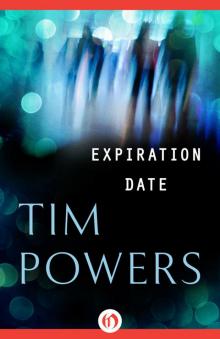 Expiration Date
Expiration Date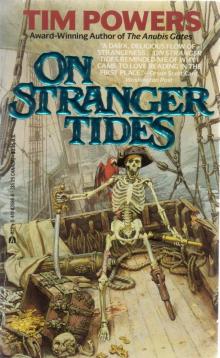 On Stranger Tides
On Stranger Tides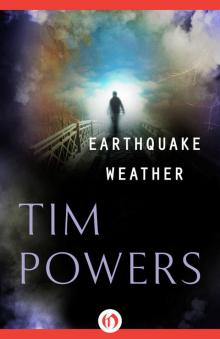 Earthquake Weather
Earthquake Weather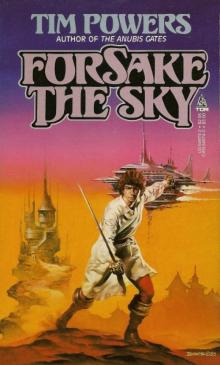 Forsake the Sky
Forsake the Sky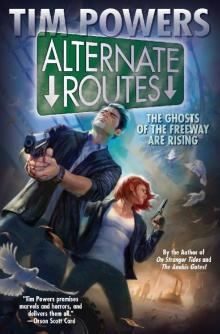 Alternate Routes
Alternate Routes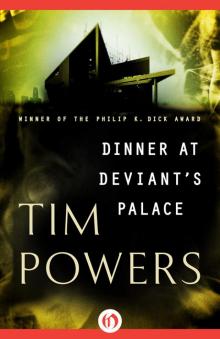 Dinner at Deviant's Palace
Dinner at Deviant's Palace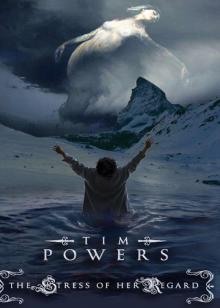 The Stress of Her Regard
The Stress of Her Regard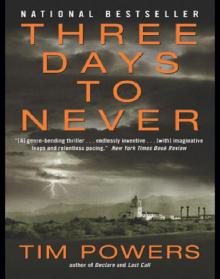 Three Days to Never: A Novel
Three Days to Never: A Novel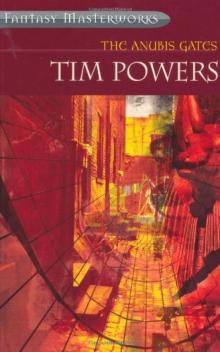 The Anubis Gates
The Anubis Gates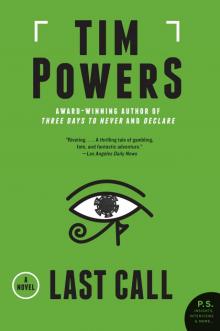 Last Call
Last Call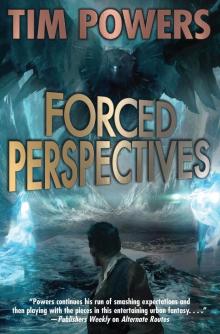 Forced Perspectives
Forced Perspectives Strange Itineraries
Strange Itineraries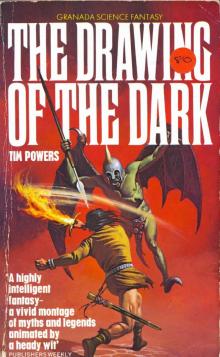 The Drawing of the Dark
The Drawing of the Dark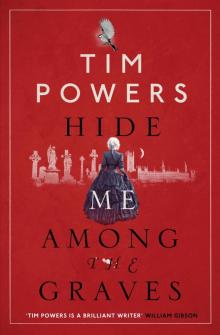 Hide Me Among the Graves
Hide Me Among the Graves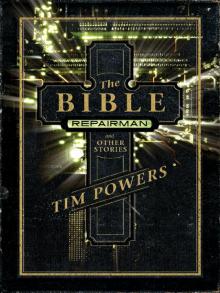 The Bible Repairman and Other Stories
The Bible Repairman and Other Stories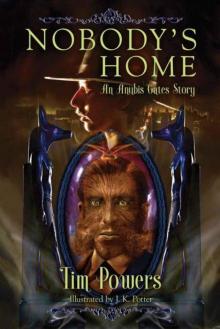 Nobody's Home: An Anubis Gates Story
Nobody's Home: An Anubis Gates Story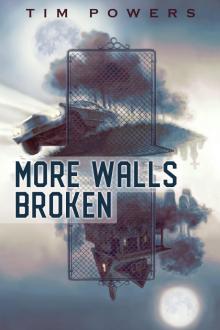 More Walls Broken
More Walls Broken The Skies Discrowned
The Skies Discrowned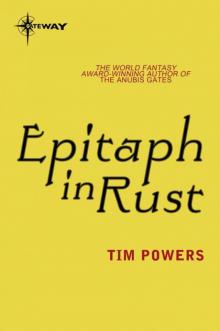 Epitaph in Rust
Epitaph in Rust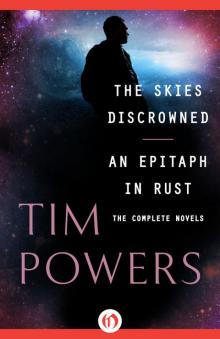 Skies Discrowned and An Epitaph in Rust
Skies Discrowned and An Epitaph in Rust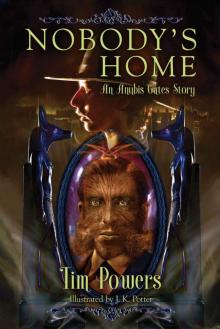 Nobody's Home
Nobody's Home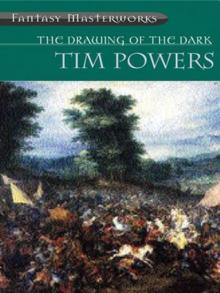 Drawing of the Dark
Drawing of the Dark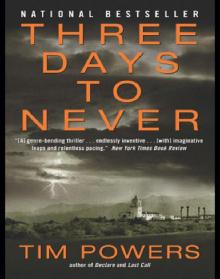 Three Days to Never
Three Days to Never